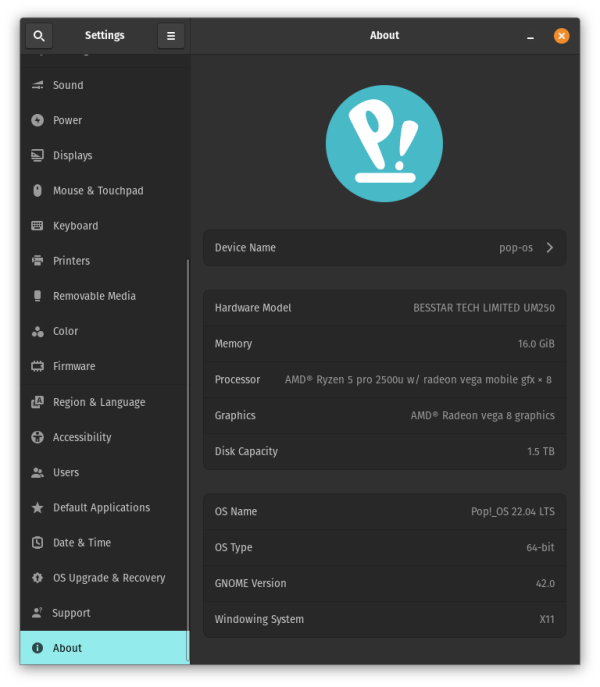
I followed the basic directions for updating my installation of Pop!_OS from 21.10 to 22.04. The best directions are here: https://www.omgubuntu.co.uk/2022/04/how-to-upgrade-to-pop-os-22-04-lts . It went smoothly, if a bit long. The time it took was more than likely due to the type of processor on my work system, which is an AMD Ryzen 5 PRO 2500U with built-in Radeon Vega Mobile Gfx. More than serviceable, but not some ground-pounding gaming rig. It runs with a 1 TB Western Digital WDS100T2B0B-00YS70 (415020WD) SATA M.2 SSD; fast enough, but not NVMe fast. This is a budget friendly rig, but a good solid workhorse none-the-less.
The tools I care about are all there. Stock Python is now at version 3.10.4, which means I can stop building my own for a while. GCC is at version 11.2, CLANG is at version 14, which means I can write and compile all of C++17 and most of C++20. People like to trash C++, but if you’re writing C++ source like you’re Microsoft in 1999, then you should be trashed. We’re now a good 20 years away from that historically horrid period. Quite a lot has been learned and fixed along the way. All the other tools I use are contemporary releases as well. A good solid workhorse is now even better.
The only peculiarity with the update is with Gnome Screenshot. It disappeared during the update. I had to reinstall it in order to grab the screenshot in Figure 1. It’s version 41, which makes me wonder if part of the update was to remove all old Gnome tools (i.e. version 41). In any event it works just fine after I recovered it.
I was wondering before I performed the update if I should use the opportunity to switch to Ubuntu 22.04. After all Ubuntu is upstream and from which Pop!_OS is derived. But Pop!_OS 22.04 came out quickly enough, so I upgraded what I had and didn’t make that drastic a change. And I’m glad I did. First, Pop!_OS 22.04 is running with a more recent Linux kernel, version 5.16.19 (Ubuntu is running 5.15). And the promise has been made that System76 will move to kernel version 5.17 in the months to come. I’ve spent quite a bit of time on this system and the older version of Linux, and haven’t had a single issue. Unlike Windows, nothing pops up to tell me I have a shit system that won’t be allowed to run the next major OS release, or bugs me about not running some sanctioned version of a browser or other tool. A Linux distribution is the best OS a retiree could ever run on their computer, except for perhaps macOS. But with macOS we’re still talking Unix. There is no way in hell I will ever run Windows again unless the computer is handed to me with Windows already installed, and I will use that computer as little as possible. If it’s hardware I own, it will always run something other than Windows.
Update
I have Fedora 35 in a Parallels VM on my MBP. I checked, and it’s already running Linux kernel version 5.17. I also checked some of the tools; Python 3.10.4 is installed as is GCC 11.2.1. Interestingly CLANG is at version 13. And I’m also waiting for Fedora 36 to drop, but it still hasn’t been released. Fedora 36 had two drop dates, 19 April and 26 April. It looks like both dates have been missed, for reasons I have yet to read about. Fedora was another distribution I’d strongly considered, but veered away from due to various rough releases I’ve had to deal with in the past. Ubuntu and Pop!_OS may not be bleeding edge, but they’re reliable and contemporary enough.

You must be logged in to post a comment.